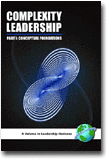
Complexity Leadership
Part 1: Conceptual Foundations
Edited by:
Mary Uhl-Bien, University of Nebraska
Russ Marion, Clemson University
A volume in the series: Leadership Horizons. Editor(s): Michelle C. Bligh, Claremont Graduate University. Melissa Carsten, Winthrop University.
Published 2007
This book introduces leadership and organizational scholars to the potenial of complexity science for broadening leadership study beyond its traditional focus on leaders’ actions and influence, to a consideration of leadership as a broader, dynamically and interactive organizing process. The book offers a primer on complexity science and its applications to organization studies, and compares the logics of complexity science with those underlying traditional leadership approaches. It describes methodological approaches for studying leadership from a complexity perspective, and offers examples of applications of complexity science to leadership theory. Chapters are written by top scholars in complexity and leadership theory.
CONTENTS
Series Introduction. Acknowledgments. Introduction: Complexity Leadership—A Framework for Leadership in the Twenty-First Century, Mary Uhl-Bien and Russ Marion. Complexity Theory for Organizations and Organizational Leadership, Russ Marion. Conceptual Foundations of Complexity Science: Development and Main Constructs, Jeffrey Goldstein. Dynamical Social Psychology: On Complexity and Coordination in Human Experience, Robin R. Vallacher and Andrzej Nowak. Pathways of Opportunity in Dynamic Organizational Networks, Martin Kilduff, Craig Crossland, and Wenpin Tsai. Individual and Collective Coevolution: Leadership as Emergent Social Structuring, David R. Schwandt. Dispelling the Myths About Leadership: From Cybernetics to Emergence, Donde Ashmos Plowman and Dennis Duchon. Beyond Transactional and Transformational Leadership: Can Leaders Still Lead When They Don’t Know What to Do? Robert G. Lord. Complexity Leadership Theory: Shifting Leadership From the Industrial Age to the Knowledge Era, Mary Uhl-Bien, Russ Marion, and Bill McKelvey. Emergent Strategy Via Complexity Leadership: Using Complexity Science and Adaptive Tension to Build Distributed Intelligence, Bill McKelvey. Research Methods for Studying the Dynamics of Leadership, Kevin J. Dooley and Benyamin Lichtenstein. Dynamic Network Leadership: Leading for Learning and Adaptability, Craig Schreiber and Kathleen M. Carley. A Complexity Perspective on Leadership Development, Ellen Van Velsor. Leadership or Luck? The System Dynamics of Intel’s Shift to Microprocessors in the 1970s and 1980s, James K. Hazy. Patterns of Leadership: A Case Study of Influence Signaling in an Entrepreneurial Firm, James K. Hazy. About the Authors.
-
Paperback978-1-59311-795-5
Web price: $62.04 (Reg. 72.99)
-
Hardcover978-1-59311-796-2
Web price: $89.24 (Reg. 104.99)
- eBook9781607526285

- BUS071000 - BUSINESS & ECONOMICS: Leadership
- BUS041000 - BUSINESS & ECONOMICS: Management
- EDU032000 - EDUCATION: Leadership
-
 Advancing Relational Leadership Research
A Dialogue among Perspectives
Advancing Relational Leadership Research
A Dialogue among Perspectives
-
 Dark and Destructive Leadership
Dark and Destructive Leadership
-
 Follower-Centered Perspectives on Leadership
A Tribute to the Memory of James R. Meindl
Follower-Centered Perspectives on Leadership
A Tribute to the Memory of James R. Meindl
-
 Implicit Leadership Theories
Essays and Explorations
Implicit Leadership Theories
Essays and Explorations
-
 Leadership and Complexity
Vol II: Empirical Evidence and Practical Applications
Leadership and Complexity
Vol II: Empirical Evidence and Practical Applications
-
 Teaching Leadership
Innovative Approaches for the 21st Century
Teaching Leadership
Innovative Approaches for the 21st Century
-
 The Connecting Leader
Serving Concurrently as a Leader and a Follower
The Connecting Leader
Serving Concurrently as a Leader and a Follower

